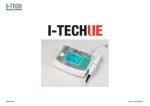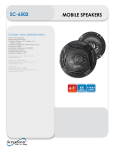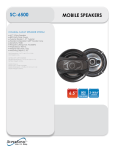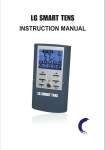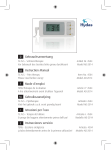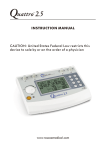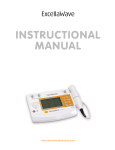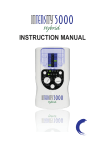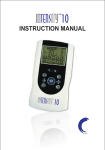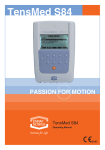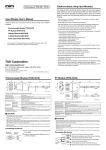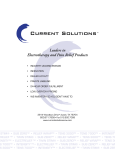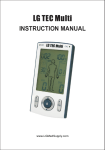Download INSTRUCTION MANUAL - Current Solutions
Transcript
INSTRUCTION MANUAL CAUTION: United States Federal Law restricts this device to sale by or on the order of a physician www.currentsolutionsnow.com This manual is valid for the Quattro TM II This user manual is published by Current Solutions™, LLC Current Solutions™, LLC reserves the right to improve and amend it at any time without prior notice. Amendments may however be published in new editions of this manual. All Rights Reserved.Rev.V1.0 © 2012 Declaration of conformity: Current Solutions™, LLC. declares that the Quattro TM II complies with following normative documents: IEC60601-1, IEC60601-1-2, IEC60601-2-10, ISO 7010 ISO14971, ISO10993-1, ISO10993-5, ISO10993-10 Contents 1. FOREWORD...................................................................4 2. SAFETY INFORMATION................................................... 4 3. INDICATIONS FOR USE………………….............................. 7 4. PRESENTATION…........................................................... 8 5. INSTALLATION.............................................................. 10 6. OPERATION……………………………………………………....11 7. MAINTENANCE……………..……………….........................29 8. TROUBLESHOOTING ….................................................30 9. SPECIFICATIONS…………..…….................................…..31 10.STORAGE …………………………………….........................33 11.DISPOSAL……………………...........…………………………..33 12.EMC TABLE………….…................................……………...34 13.WARRANTY…..…....................................................…...38 14.NORMALIZED SYMBOLS……………………......……………...39 3 1. FOREWORD 1.1 General information Thank you for purchasing the Quattro II . The microprocessor TM controlled Quattro II provides interferential (4-pole), premodulated (2-pole interferential), medium frequency (Russian), EMS and TENS waveform. You can choose between several different amplitude modulation options. The interferential and premodulated modes offer frequency modulation as well as a static frequency option. 1.2 Introduction to This Manual This manual has been written for the users of Quattro II . It contains general information on the operation, precautionary practices, and maintenance information. In order to maximize its use, efficiency, and the life of the system, please read this manual thoroughly and become familiar with the controls, as well as the accessories before operating the system. TM TM 2. SAFETY INFORMATIONS 2.1 Caution 4 1) Keep yourself informed of the contraindications. 2) Read, understand, and practice the warnings, cautions and operating instructions. Know the limitations and hazards associated with using any device. Observe the precautionary and operational decals placed on the unit. Always follow the operating instructions prescribed by your healthcare practitioner 3) DO NOT operate this unit in an environment where other devices are being used that intentionally radiates electromagnetic energy in an unshielded manner. 4) DO NOT use sharp objects such as a pencil point or ballpoint pen to operate the buttons on the control panel. 5) Inspect Applicator cables and associated connectors before each use. 6) This device should not be used adjacent to or stacked with other equipment and that if adjacent or stacked use is necessary, this machine should be observed to verify normal operation in the configuration in which it will be used. 7) This device needs special precautions regarding EMC and needs to be installed and put into service according to the EMC information provided in the manual. 8) Portable and mobile RF communications equipment can affect this device. Do not use a mobile phone or other device that emit electromagnetic fields, near the unit. This may result in incorrect operation of the device. 9) This device has been thoroughly test and inspected to assure proper performance and operation! 2.2 WARNING 1 ) U.S.A. Federal Law restricts these devices to sale by, or on the order of, a physician or licensed practitioner. This device should be used only under the continued supervision of a physician or licensed practitioner. 2) Make certain the unit is electrically grounded by connecting only to a grounded electrical service receptacle conforming to the applicable national and local electrical codes. 3) Care must be taken when operating this equipment around other equipment. Potential electromagnetic or other interference could occur to this or to the other equipment. Try to minimize this interference by not using other equipment in conjunction with it. 4) Before administering any treatment to a patient you should become acquainted with the operating procedures for each mode of treatment available, as well as the indications, contraindications, warnings and precautions. Consult other resources for additional information regarding the application of electrotherapy. 5) To prevent electrical shock, disconnect the unit from the power source before attempting any maintenance procedures. 6) The use of accessories, transducers and cables than those specified, with the exception of transducers and cables sold by the manufacturer as replacement parts for internal components, may result in increased emissions or decreased immunity of the device. 7) This device is not designed to be use in an MRI Environment and should be removed prior to MRI exposure. 8) Do not apply stimulation over the patient's neck because this could cause severe muscle spasms resulting in closure of the airway, difficulty in breathing, or adverse effects on heart rhythm or blood pressure; 9) Do not apply stimulation across the patient's chest, because the introduction of electrical current into the chest may cause rhythm disturbances to the patient's heart, which could be lethal; 10) Do not apply stimulation over open wounds or rashes, or over swollen, red, infected, or inflamed areas or skin eruptions (e.g., phlebitis, thrombophlebitis, varicose veins); 11) Do not apply stimulation over, or in proximity to, cancerous lesions; 12) Do not apply stimulation in the presence of electronic monitoring equipment (e.g., cardiac monitors, ECG alarms), which may not operate properly when the electrical stimulation device is in use; 13) Do not apply stimulation when the patient is in the bath or shower; 14) Do not apply stimulation while the patient is sleeping; and 5 15) Do not apply stimulation while the patient is driving, operating machinery, or during any activity in which electrical stimulation can put the patient at risk of injury. 16) Consult with the patient's physician before using this device, because the device may cause lethal rhythm disturbances to the heart in susceptible individuals; and 17) Apply stimulation only to normal, intact, clean, healthy skin. 18) This device should not be used for symptomatic local pain relief unless etiology is established or unless a pain syndrome has been diagnosed. 19) Patients with arterial or venous thrombosis or thrombophlebitis are at risk of developing embolisms when electrical stimulation is applied over or adjacent to the vessels containing the thrombus. If a patient has a history of deep vein thrombosis, even many years past, the affected area should not be stimulated. 20) Fresh fractures should not be stimulated in order to avoid unwanted motion. 21) Stimulation should not be applied immediately following trauma or to tissues susceptible to hemorrhage. 22) Do not apply electrodes directly over the eyes or inside body cavities. 23) Do not use electrical stimulation in conjunction with high frequency surgical equipment or microwave or shortwave therapy systems. 24) Keep electrodes separated during treatment. Electrodes in contact with each other could result in improper stimulation or skin burns. 25) Since the effects of stimulation of the brain are unknown, stimulation should not be applied across the head, and electrodes should not be placed on opposite sides of the head. 2.3 1 ) Do not use this device on patients who have a cardiac pacemaker, CONTRAIimplanted defibrillator, or other implanted metallic or electronic NDICATIONS device, because this may cause electric shock, burns, electrical interference, or death. 2) Do not use this device on patients whose pain syndromes are undiagnosed. 2.4 1) PRECAUTIONS 2) 3) 4) Federal law (USA) restricts this device to sale by or on the order of a physician. The long-term effects of chronic electrical stimulation are unknown. Electrical stimulation devices have no curative value. Electrical stimulation is not a substitute for pain medications and other pain management therapies 5) Effectiveness is highly dependent upon patient selection by a practitioner qualified in the management of pain patients; 6) The safety of electrical stimulation during pregnancy has not been established; 6 7) Some patients may experience skin irritation or hypersensitivity due to the electrical stimulation or electrical conductive medium (gel); 8 ) Patients with suspected or diagnosed heart disease should follow precautions recommended by their physicians; and 9 ) Patients with suspected or diagnosed epilepsy should follow precautions recommended by their physicians. 10) Use caution when the patient has a tendency to bleed internally, such as following an injury or fracture; 11) Use caution following recent surgical procedures when stimulation may disrupt the patient's healing process; 12) Use caution if stimulation is applied over the menstruating or pregnant uterus; and 13) Use caution if stimulation is applied over areas of skin that lack normal sensation. 14) Use this device only under the continued supervision of a licensed practitioner. 15) Electrical stimulation is ineffective for pain of central origin. 16) Use extreme caution when treating desensitized areas or on patients who may not be able to report discomfort or pain 17) Patients should not be left unattended during any treatment. 18) Keep this device out of the reach of children; 2.5 Adverse reaction Skin irritation, inflammation, and electrode burns beneath the electrodes are potential adverse reactions. Patients may experience headache and other painful sensations during or following the application of electrical stimulation near the eyes and to the head and face; and Patients should stop using the device and should consult with their physicians if they experience adverse reactions from the device. 3. INDICATIONS FOR USE For TENS, Interferential and premodulated(IFC): 1. Symptomatic relief of chronic intractable pain; 2. Reduction of inflammation; 3. Post-traumatic acute pain and edema; 4. Post-surgical acute pain and edema. Additionally for EMS and Russian: 1. Relaxation of Muscle spasms and edema reduction, 2. Prevention or retardation of disuse atrophy, 3. Increasing local blood circulation, 4. Muscle re-education, 5. Maintaining or increasing range of motion, 6. Immediate postsurgical stimulation of calf muscles to prevent venous thrombosis. 7 4. PRESENTATION 1 2 6 7 8 4.1 Panel For front view B2 B4 3 B6 B8 B1 B3 B5 B7 9 4 5 DC15V/1.2A 4 10 2 3 11 12 1) 2) 3) 4) 5) 6) 7) 8) 9) 8 Adjust the output intensity of channel 1. Adjust the output intensity of channel 2. Parameters control knob and pause button. Stop treatment button. Power indicator. LCD display: Shows the current information of the device. Adjust the output intensity of channel 3. Adjust the output intensity of channel 4. Eight parameters selection buttons, see below for details: B1: Toggle the therapeutic waveform. B2: Toggle the therapeutic program and select the output mode (CC/CV). B3: Toggle the parameter Vector/Duty/F.M./Burst B4: Toggle the parameter Freq./C.F. B5: Toggle the parameter Beat H./A.M. B6: Toggle the parameter Beat L./P.Dur. B7: Toggle the parameter Treat./Cycle/Ramp time B8: Step button 1 Remark: CC — Constant current output mode. CV — Constant voltage output mode. F.M. — Frequency Modulation Burst— Burst Frequency Freq. — Frequency C.F. — Carrier Frequency Duty — Duty Cycle for Russian waveform Beat H. — Sweep High Beat Frequency A.M. — Amplitude Modulation Beat L. — Sweep Low Beat Frequency P.Dur. — Pulse Duration Treat. — Treatment time Cycle— Cycle time Ramp— Ramp time 10) Adapter receptacle 11) ON/OFF switch 12) Output connector: connect with connector of cable 4.2 User Interface Symbol definitions IFC- Interferential (Traditional 4 Pole) Symbol definitions Premodulated (Traditional 2 Pole IFC) Electrical stimulation Time indicator Electrical output channel 1 indicator Electrical output channel 2 indicator Electrical output channel 3 indicator Electrical output channel 4 indicator Constant current control Constant Voltage control 9 5. INSTALLATION 5.1 Before Use Remove the equipment and all accessories from shipping carton and box. Visually check if there is any damage or missing parts or accessories. If yes, please report to local dealer or retailer where you purchase this unit. TM Your Quattro II equipment contains the following accessories. 1 4 3 2 5 6 7 8 10 9 11 12 INSTRUCTION MANUAL CAUTION: United States Federal Law restricts this device to sale by or on the order of a physician www.currentsolutionsnow.com Part 10 Quantity 1 Rubber Electrodes,60x90mm 4pcs 2 Rubber Electrodes,70x110mm 4pcs 3 Electrode Sponges,70x100mm 4pcs 4 Electrode Sponges,80x120mm 4pcs 5 Self-adhesive Electrodes,50x50mm 8pcs 6 Self-adhesive Electrodes,50x100mm 8pcs 7 Elastic Wrap,75x1200mm 2pcs 8 Elastic Wrap ,75x600mm 2pcs 9 Electrode wires (black/red) 4pcs 10 Adapter 100-240V/50-60Hz 1pc 11 Connector of cable 2pcs 12 User Manual 1pc 5.2 Connection of the power adapter Connect the power adapter to the device connector. Connect the power adapter to a wall socket. Caution: Prior to connecting this apparatus to the power supply, check that the voltage and frequency stated on the rating label match with the available power supply. The power adapter is a part of the supply circuit on which the device's TM safety partly depends. The approvals for Quattro II are only valid if used in combination with this type of adapter. 5.3 Switch on the device, using ON/OFF switch ( 11). Switching on 5.4 Switching off and disconnect power adapter Switch off the device by switching the ON/OFF switch from [ ] to [ ] position. Pull out the power adapter from the wall socket. Pull out the power adapter from device. 6. OPERATION 6.1 Measures with regard to treatments 6.1.1 Electrotherapy Before the treatment Ensure there are no contraindications to treatment. Inspect the treatment area skin seriously for any abrasions, inflammation, surface veins etc. Clean the skin of the treatment area with soap or alcohol (70%). If the skin is hairy, shaving can get optimal treatment. Test the heat sensibility of the treatment area. 6.1.2 Electrode Placement Examine the skin for any wounds and clean the skin. Apply the electrodes to the treatment area. Ensure that the electrodes are applied securely to the skin. Ensure good contact between each electrode and the skin. Check the electrode contact regularly during the treatment. Examine the skin again after the treatment. Choose electrodes that fit the anatomy. Follow electrode manufacturer’s instructions. To avoid skin irritation due to high current density, do not use electrodes smaller in surface area than 25cm 2 self-adhesive electrode. 11 Caution Keep electrodes separated during treatment. Electrodes in contact with each other could result in improper stimulation or skin burns. Output current density is related to electrode size. Improper application may result in patient injury. If any question arises as to the proper electrode size, consult a licensed practitioner prior to therapy session. Powered muscle stimulators should be used only with the leads and electrodes recommended by the manufacturer. 6.1.3 Adhesive electrodes This device is supplied with 8 pieces 50mm×50mm and 8 pieces 50mm×100mm adhesive electrodes. You can select the right adhesive electrodes according to treatment area and output current density. It is recommended that manufacturer's Electrodes be used whenever possible to ensure the highest level of contact with the treatment area and most uniform delivery of the prescribed electrotherapy treatment. Properly dispose of used Electrodes upon completion of the therapy session. If you are unsure of your electrode adhesive properties, order new replacement electrodes. Replacement electrodes should be re-ordered through or on the advice of your physician to ensure proper quality. Apply electrodes to the exact site indicated by your physician or therapist, before applying electrodes, be sure the skin surface over which electrodes are placed is thoroughly cleaned and dried. Make sure the electrodes are placed firmly to the skin and make good contact between the skin and the electrodes. Place the electrodes over the skin; attach them properly, firmly, and evenly. Caution: 12 1) Before applying the self-adhesive electrodes, it is recommended to wash and degrease the skin, and then dry it. 2) Do not turns on the device when the electrodes are not positioned on the body. 3) Never remove the self-adhesive electrodes from the skin while the device is still turns on. 4) It is recommended that, at minimum, 50mm x 50mm self-adhering based, square electrodes are used at the treatment area. Electrode Instructions Connecting Lead Wires Securing Electrodes 6.1.4. Rubber electrodes Reusable rubber Electrodes Connecting Lead Wires Conductive Medium 1 Conductive Medium 2 Insert the lead with the Red (+) electrode connector into one adhesive Electrode. Insert the lead with the Black (-) electrode connector into the other electrode. Make certain the lead wires are seated completely into the electrodes, there are no bare metal of the pins exposed. Remove the adhesive Electrodes from the protective backing and apply to the treatment area as prescribed. Ensure that the entire electrode surface is in contact with patient skin by pressing into place. If used for delivery of electrotherapy, there are two conductive mediums for you to select, the first one is use electrode sponges as conductive mediums, another is use other conductive medium such as Transmission Gel. These Rubber Electrodes should be secured to the treatment area using the Nylon Wraps shipped with the Therapy System. Insert the lead with the Red (+) electrode connector into one rubber electrode. Insert the lead with the Black (-) electrode connector into the other rubber electrode. Make certain the lead wires are seated completely into the electrodes. Inserted the Rubber Electrodes into the electrode sponges moistened with distilled water prior to placement on the patient. Liberally apply Transmission Gel to electrode prior to placement on patient. Please note: Please purchase the Transmission gel with CE mark or that is cleared by the FDA. 13 Securing Electrodes 6.2 Quick Set-up for Electrical Stimulation Use Nylon Wrap to secure each rubber electrode in position on the patient. 1. In order to turn on the device, please press ON/OFF switch to [ ] icon which is located on the side of the device 2. When you turn the Quattro II on, the device will get down to self- check about 6~8 seconds, and then the default parameters are displayed the last treatment mode. TM 3. Connect the electrode wires to the cable; please note the color of the wires and the color marks on the cable, they should be corresponding. Caution: If you want to use 4 channels, please connect all electrode wires to two cables. 2 5. Connect the electrodes to electrode wires. 6. Place the electrodes on the patient according to section 6.1. 7. There are 5 therapeutic waveforms for you to select. Press the “ Waveform” button to toggle the therapeutic waveform, and then rotating the Parameters control knob (③) to select waveform like IF-4P, IF-2P, TENS, EMS and Russian. 14 8. Each therapeutic waveform has 10 programs. The details parameters for each program please refer to section 6.3 in this manual. Press the “B2”Program button to toggle the therapeutic program, and then rotating the Parameters control knob to select the therapeutic programs in corresponding waveform. 9. Press “B2” Program button to select “CC ” or “CV ” control mode. 10. Adjust the output intensity and start electrical treatment that you are using by rotating the output intensity adjustable knobs on the control panel. 0.5mA/step or 0.5V/step. 11. For safety using, load detection was designed in this device after the output intensity surpass 10.0mA/10.0V. If there are no electrodes stuck on patient ’ skin, an alarm buzzer sound will appear and the intensity value flashing. 12. Press the “ ” button to stop treatment if any emergency happened. 13. Press the “ ” button to pause treatment; you can press it again to restart the treatment. 6.3 Using Preset Programs Each therapeutic waveform has 10 programs. They have default parameters for each program, but you can set and save the parameters according to patient ’s need. the default parameters for each program please refer to below: 15 4-Pole Interferential preset programs Waveform ProgCC/ Vector Vector Beat. Beat. Treat. C.F. Phase Time H L ram CV (Auto) (Manual) 1 2 3 4 5 Interferential Traditional (4P) 6 7 8 9 10 16 1 CC 0 45 4kHz 110Hz 100Hz 15min 2 CC 0 45 4kHz 110Hz 100Hz 0min 3 CC 0 45 4kHz 110Hz 100Hz 0min 1 CC 0 45 4kHz 150Hz 100Hz 10min 2 CC 0 45 4kHz 150Hz 100Hz 0min 3 CC 0 45 4kHz 150Hz 100Hz 0min 1 CC 0 45 4kHz 50Hz 50Hz 15min 2 CC 0 45 4kHz 50Hz 50Hz 0min 3 CC 0 45 4kHz 50Hz 50Hz 0min 1 2 CC CC 0 0 45 45 4kHz 150Hz 90Hz 15min 4kHz 150Hz 90Hz 0min 3 CC 0 45 4kHz 150Hz 90Hz 0min 1 CC 0 45 4kHz 110Hz 100Hz 15min 2 CC 0 45 4kHz 110Hz 100Hz 0min 3 CC 0 45 4kHz 110Hz 100Hz 0min 1 CC 0 45 4kHz 110Hz 100Hz 15min 2 CC 0 45 4kHz 110Hz 100Hz 15min 3 CC 0 45 4kHz 110Hz 100Hz 15min 1 CC 0 45 4kHz 110Hz 100Hz 15min 2 CC 0 45 4kHz 110Hz 100Hz 15min 3 CC 0 45 4kHz 110Hz 100Hz 15min 1 CC 0 45 4kHz 110Hz 100Hz 15min 2 CC 0 45 4kHz 110Hz 100Hz 15min 3 CC 0 45 4kHz 110Hz 100Hz 15min 1 CC 0 45 4kHz 110Hz 100Hz 15min 2 CC 0 45 4kHz 110Hz 100Hz 15min 3 CC 0 45 4kHz 110Hz 100Hz 15min 1 CC 0 45 4kHz 110Hz 100Hz 15min 2 CC 0 45 4kHz 110Hz 100Hz 15min 3 CC 0 45 4kHz 110Hz 100Hz 15min 2-Pole Interferential programs Waveform ProgCC/ Phase ram CV 1 2 3 4 IFC Premod. (2P) 5 6 7 8 9 10 C.F. Beat. Beat. H L Cycle Treat. Time 1 CC 2500Hz 110Hz 100Hz continuous 15min 2 CC 2500Hz 110Hz 100Hz continuous 0min 3 CC 2500Hz 110Hz 100Hz continuous 0min 1 CC 2500Hz 150Hz 100Hz continuous 10min 2 CC 2500Hz 150Hz 100Hz continuous 0min 3 CC 2500Hz 150Hz 100Hz continuous 0min 1 CC 2500Hz 50Hz 50Hz continuous 15min 2 CC 2500Hz 50Hz 50Hz continuous 0min 3 CC 2500Hz 50Hz 50Hz continuous 0min 1 CC 2500Hz 150Hz 90Hz continuous 15min 2 CC 2500Hz 150Hz 90Hz continuous 0min 3 CC 2500Hz 150Hz 90Hz continuous 0min 1 CC 2500Hz 110Hz 100Hz continuous 15min 2 CC 2500Hz 110Hz 100Hz continuous 0min 3 CC 2500Hz 110Hz 100Hz continuous 0min 1 CC 2500Hz 110Hz 100Hz continuous 15min 2 CC 2500Hz 110Hz 100Hz continuous 15min 3 CC 2500Hz 110Hz 100Hz continuous 15min 1 CC 2500Hz 110Hz 100Hz continuous 15min 2 CC 2500Hz 110Hz 100Hz continuous 15min 3 CC 2500Hz 110Hz 100Hz continuous 15min 1 CC 2500Hz 110Hz 100Hz continuous 15min 2 CC 2500Hz 110Hz 100Hz continuous 15min 3 CC 2500Hz 110Hz 100Hz continuous 15min 1 CC 2500Hz 110Hz 100Hz continuous 15min 2 CC 2500Hz 110Hz 100Hz continuous 15min 3 CC 2500Hz 110Hz 100Hz continuous 15min 1 CC 2500Hz 110Hz 100Hz continuous 15min 2 CC 2500Hz 110Hz 100Hz continuous 15min 3 CC 2500Hz 110Hz 100Hz continuous 15min 17 TENS programs Waveform ProgCC/ P. F.M. Burst Freq A.M. Phase Dur. ram CV 1 2 3 4 5 6 7 8 9 10 18 Cycle Treat. Time 1 CC 0 0 120Hz 0% 70μs continuous 14min 2 CC 0 0 120Hz 0% 70μs continuous 0min 3 CC 0 0 120Hz 0% 70μs continuous 0min 1 CC 0 0 200Hz 0% 60μs continuous 20min 2 CC 0 0 200Hz 0% 60μs continuous 0min 3 CC 0 0 200Hz 0% 60μs continuous 0min 1 CC 0 0 10Hz 0% 180μs continuous 14min 2 CC 0 0 10Hz 0% 180μs continuous 0min 3 CC 0 0 10Hz 0% 180μs continuous 0min 1 CC 0 0 80Hz 0% 100μs continuous 30min 2 CC 0 0 80Hz 0% 100μs continuous 0min 3 CC 0 0 80Hz 0% 100μs continuous 0min 1 CC 50Hz 0 180Hz 0% 30μs continuous 16min 2 CC 50Hz 0 180Hz 0% 30μs continuous 0min 3 CC 50Hz 0 180Hz 0% 30μs continuous 0min 1 CC 0 0 120Hz 0% 70μs continuous 14min 2 CC 0 0 120Hz 0% 70μs continuous 14min 3 CC 0 0 120Hz 0% 70μs continuous 14min 1 CC 0 0 120Hz 0% 70μs continuous 14min 2 CC 0 0 120Hz 0% 70μs continuous 14min 3 CC 0 0 120Hz 0% 70μs continuous 14min 1 CC 0 0 120Hz 0% 70μs continuous 14min 2 CC 0 0 120Hz 0% 70μs continuous 14min 3 CC 0 0 120Hz 0% 70μs continuous 14min 1 CC 0 0 120Hz 0% 70μs continuous 14min 2 CC 0 0 120Hz 0% 70μs continuous 14min 3 CC 0 0 120Hz 0% 70μs continuous 14min 1 CC 0 0 120Hz 0% 70μs continuous 14min 2 CC 0 0 120Hz 0% 70μs continuous 14min 3 CC 0 0 120Hz 0% 70μs continuous 14min EMS programs Waveform ProgCC/ P. F.M. Burst Freq A.M. Phase Dur. ram CV 1 2 3 4 5 6 7 8 9 10 Cycle Treat. Time 1 CC 0 0 120Hz 0% 70μs continuous 14min 2 CC 0 0 120Hz 0% 70μs continuous 0min 3 CC 0 0 120Hz 0% 70μs continuous 0min 1 CC 0 0 200Hz 0% 60μs continuous 20min 2 CC 0 0 200Hz 0% 60μs continuous 0min 3 CC 0 0 200Hz 0% 60μs continuous 0min 1 CC 0 0 10Hz 0% 180μs continuous 20min 2 CC 0 0 10Hz 0% 180μs continuous 0min 3 CC 0 0 10Hz 0% 180μs continuous 0min 1 CC 0 0 80Hz 0% 100μs continuous 30min 2 CC 0 0 80Hz 0% 100μs continuous 0min 3 CC 0 0 80Hz 0% 100μs continuous 0min 1 CC 50Hz 0 180Hz 0% 30μs continuous 16min 2 CC 50Hz 0 180Hz 0% 30μs continuous 0min 3 CC 50Hz 0 180Hz 0% 30μs continuous 0min 1 CC 0 0 120Hz 0% 70μs continuous 14min 2 CC 0 0 120Hz 0% 70μs continuous 14min 3 CC 0 0 120Hz 0% 70μs continuous 14min 1 CC 0 0 120Hz 0% 70μs continuous 14min 2 CC 0 0 120Hz 0% 70μs continuous 14min 3 CC 0 0 120Hz 0% 70μs continuous 14min 1 CC 0 0 120Hz 0% 70μs continuous 14min 2 CC 0 0 120Hz 0% 70μs continuous 14min 3 CC 0 0 120Hz 0% 70μs continuous 14min 1 CC 0 0 120Hz 0% 70μs continuous 14min 2 CC 0 0 120Hz 0% 70μs continuous 14min 3 CC 0 0 120Hz 0% 70μs continuous 14min 1 CC 0 0 120Hz 0% 70μs continuous 14min 2 CC 0 0 120Hz 0% 70μs continuous 14min 3 CC 0 0 120Hz 0% 70μs continuous 14min 19 Russian programs Waveform ProgCC/ C.F. Freq. Duty Cycle Phase ram CV 1 2 3 4 5 6 7 8 9 10 20 Ramp Treat. Time 1 CC 2500Hz 50Hz 50% 10s/10s 1s 10min 2 CC 2500Hz 50Hz 50% 10s/10s 1s 0min 3 CC 2500Hz 50Hz 50% 10s/10s 1s 0min 1 CC 2500Hz 50Hz 50% 4s/12s 1s 10min 2 CC 2500Hz 50Hz 50% 4s/12s 1s 0min 3 CC 2500Hz 50Hz 50% 4s/12s 1s 0min 1 CC 2500Hz 50Hz 50% 4s/12s 1s 10min 2 CC 2500Hz 50Hz 50% 4s/12s 1s 0min 3 CC 2500Hz 50Hz 50% 4s/12s 1s 0min 1 CC 2500Hz 50Hz 50% 10s/10s 1s 10min 2 CC 2500Hz 50Hz 50% 10s/10s 1s 0min 3 CC 2500Hz 50Hz 50% 10s/10s 1s 0min 1 CC 2500Hz 50Hz 50% 5s/5s 1s 20min 2 CC 2500Hz 50Hz 50% 5s/5s 1s 0min 3 CC 2500Hz 50Hz 50% 5s/5s 1s 0min 1 CC 2500Hz 50Hz 50% 10s/10s 1s 10min 2 CC 2500Hz 50Hz 50% 10s/10s 1s 10min 3 CC 2500Hz 50Hz 50% 10s/10s 1s 10min 1 CC 2500Hz 50Hz 50% 10s/10s 1s 10min 2 CC 2500Hz 50Hz 50% 10s/10s 1s 10min 3 CC 2500Hz 50Hz 50% 10s/10s 1s 10min 1 CC 2500Hz 50Hz 50% 10s/10s 1s 10min 2 CC 2500Hz 50Hz 50% 10s/10s 1s 10min 3 CC 2500Hz 50Hz 50% 10s/10s 1s 10min 1 CC 2500Hz 50Hz 50% 10s/10s 1s 10min 2 CC 2500Hz 50Hz 50% 10s/10s 1s 10min 3 CC 2500Hz 50Hz 50% 10s/10s 1s 10min 1 CC 2500Hz 50Hz 50% 10s/10s 1s 10min 2 CC 2500Hz 50Hz 50% 10s/10s 1s 10min 3 CC 2500Hz 50Hz 50% 10s/10s 1s 10min 6.4 Each stimulation set-up procedure 6.4.1 4-Pole Interferential Stimulation Set-up Procedure 1. In order to turn on the device, please press ON/OFF switch to [ ] icon which is located on the side of the device. 2. When you turn the Quattro II , the device will get down to self- check about 6~8 seconds, and then the default parameters are displayed the last treatment mode. TM 3. Press “B1” Waveform button to toggle the therapeutic waveform, then rotating the parameters control knob (③) to select “ ” waveform. 4. Press “B2” Program button to toggle the therapeutic program, and then rotating the parameters control knob (③) to select the therapeutic programs from P01 to P10. Each program has 3 treatment phases, you can set and save the parameters according to patient ’s need. 5. Press “B2” Program button to select “CC ” or “CV ” control mode. 6. There are two modes in Quattro II , press and hold “”B8” button to switch Normal mode and Professional mode. In professional mode, each program has 3 treatment phase, the LCD display like left figure. Rotating the parameters control knob (③) to select phase program from 1 to 3 when the device enter into professional mode. The parameters of each phase program can be set according to following methods. TM 7. Press “B3” button to toggle Vector parameter, then rotating the parameters control knob (③) to set the vector (manual) parameter from 0°to 90°,15°/step. 8. Press “B3”button again, the vector parameter change to auto mode, the LCD display “0%” like left figure. rotating the parameters control knob (③) to set the vector (auto) parameter from 0 % to 100%, 20%/step. 21 9. Press “B5” button to toggle Beat H. parameter, then rotating the parameters control knob (③) to set the parameter from (Beat. L) Hz to 150Hz, 1Hz/step. 10. Press “B6” button to toggle Beat L . parameter, then rotating the adjust parameters contorl knob (③) to set the parameter from 1Hz to (Beat. H)Hz, 1Hz/step. 11. Press “B7” button to toggle Treat. time parameter, then rotating the parameters control knob (③) to set the treatment time from 1min to 60min, 1min/step. 12. Stick the electrodes on the patient. You will need two electrodes for each channel, four in total. ① ② 13. Adjust the output intensity and start electrical treatment that you are using by rotating the output intensity adjustable knobs on the control panel. 0.5mA/step or 0.5V/step. For safety using, load detection was designed in this device after the output intensity surpass 10.0mA/10.0V. If there are no electrodes stuck on patient ’ skin, an alarm buzzer sound will appear and the intensity value flashing. 14. Press the “ ” button to stop treatment if any emergency happened. 15. Press the “ ” button to pause treatment; you can press it again to restart the treatment. 22 6.4.2 2-Pole Interferential Stimulation Set-up Procedure 1. In order to turn on the device, please press ON/OFF switch to[ ] icon which is located on the side of the device. 2. When you turn the Quattro II on, the device will get down to self- check about 6~8 seconds, and then the default parameters are displayed the last treatment mode. TM 3. Press “B1” Waveform button to toggle the therapeutic waveform, then rotating the parameters control knob (③) to select “ ” waveform. 4. Press “B2” Program button to toggle the therapeutic program, and then rotating the parameters control knob (③) to select the therapeutic programs from P01 to P10. Each program has 3 treatment phases, you can set and save the parameters according to patient ’s need. 5. Press “B2” Program button to select “CC ” or “CV ” control mode. 6. There are two modes in Quattro II , press and hold ”B8” button to switch Normal mode and Professional mode. In professional mode, each program has 3 treatment phase, the LCD display like left figure. Rotating the parameters control knob (③) to select phase program from 1 to 3 when the device enter into professional mode. The parameters of each phase program can be set according to following methods. TM 8. Press “B5” button to toggle Beat H. parameter, then rotating the parameters control knob (③) to set the parameter from (Beat. L) Hz to 150Hz, 1Hz/step. 9. Press “B6” button to toggle Beat L . parameter, then rotating the parameters control knob (③) to set the parameter from 1Hz to (Beat. H)Hz, 1Hz/step. 10. Press “B7” button to toggle Treat. time parameter, then rotating the parameters control knob (③) to set the treatment time from 1min to 60min, 1min/step. 23 11. Press “B7” button again to toggle Cycle time parameter, then rotating the parameters control knob (③) to select the cycle time (work time/rest time) from “-/-(continuous) ”, “5/5”, “4/12”, “10/10”, “10/20”, “10/30” and “10/50”. 12. Stick the electrodes on the patient. You can use one or two channel as your needs. 13. Adjust the output intensity and start electrical treatment that you are using by rotating the output intensity adjustable knob on the control panel. 0.5mA/step or 0.5V/ step. For safety using, load detection was designed in this device after the output intensity surpass 10. 0mA/10. 0V. If there are no electrodes stuck on patient ’ skin, an alarm buzzer sound will appear and the intensity value flashing. 14. Press the “ ” button to stop treatment if any emergency happened. 15. Press the “ ” button to pause treatment; you can press it again to restart the treatment. 24 6.4.3 TENS and EMS Stimulation Set-up Procedure 1. In order to turn on the device, please press ON/OFF switch to [ ] icon which is located on the side of the device. 2. When you turn the Quattro II on, the device will get down to self- check about 6~8 seconds, and then the default parameters are displayed the last treatment mode. TM / 3. Press “B1” Waveform button to toggle the therapeutic waveform, then rotating the parameters control knob (③) to select TENS or EMS waveform. 4. Press “B2” Program button to toggle the therapeutic program, and then rotating the parameters control knob (③) to select the therapeutic programs from P01 to P10. Each program has 3 treatment phases, you can set and save the parameters according to patient ’s need. 5. Press “B2” Program button to select “CC ” or “CV ” control mode. 6. There are two modes in Quattro II , press and hold ”B8” button to switch Normal mode and Professional mode. In professional mode, each program has 3 treatment phase, the LCD display like left figure. Rotating the parameters control knob (③) to select phase program from 1 to 3 when the device enter into professional mode. The parameters of each phase program can be set according to following methods. TM 7. Press “B3” button to toggle F.M. parameter, then rotating the parameters control knob (③) to set the F.M. parameter from 0Hz to 249Hz, 1Hz/step. But F.M.+Freq.≤250Hz. 8. Press “B3”button again to toggle Burst rate, then rotating the parameters control knob (③) to set the Burst rate from 0Hz to 10Hz, 1Hz/step. But Burst×8≤Freq. 9. Press “B4” button to toggle Freq. parameter, then rotating the parameters control knob (③) to set the frequency from 1Hz to250Hz, 1Hz/step. But Freq. ≥Burst x 8 or Freq.≤ 250-F.M. 25 10. Press “B5” button to toggle A.M. parameter, then rotating the parameters control knob (③) to set the parameter from 0% to100%, (0% means the output intensity always in setting value; 100% means the output intensity changes form 0 to setting value) 20%/step. 11. Press “B6” button to toggle P.Dur. parameter, then rotating the parameters control knob (③) to set the pulse duration from 30µs to 400µs, 5µs/step. 12. Press “B7” button to toggle Treat. time parameter, then rotating the parameters control knob (③) to set the treatment time from 1min to 60min, 1min/step. 13. Press “B7” button again to toggle Cycle time parameter, then rotating the parameters control knob (③) to select the cycle time (work time/rest time)from “-/-(continuous)”, “4/4 ”, “4/8”, “7/7”, “5/5”, “4/12”, “10/10”, “ 10/20”, “10/30” and “10/50”. 14. Stick the electrodes on the patient. You can use one or two channel as your needs. 15. Adjust the output intensity and start electrical treatment that you are using by rotating the output intensity adjustable knob on the control panel. 0.5mA/step or 0.5V/ step. For safety using, load detection was designed in this device after the output intensity surpass 10. 0mA/10. 0V. If there are no electrodes stuck on patient ’ skin, an alarm buzzer sound will appear and the intensity value flashing. 16. Press the “ ” button to stop treatment if any emergency happened. 17. Press the “ ” button to pause treatment; you can press it again to restart the treatment. 26 6.4.4 Russian Stimulation Set-up Procedure 1. In order to turn on the device, please press ON/OFF switch to [ ] icon which is located on the side of the device. 2. When you turn the Quattro II on, the device will get down to self- check about 6~8 seconds, and then the default parameters are displayed the last treatment mode. TM 3. Press “B1” Waveform button to toggle the therapeutic waveform, then rotating the parameters control knob (③) to select “ ” waveform. 4. Press “B2” Program button to toggle the therapeutic program, and then rotating the parameters control knob (③) to select the therapeutic programs from P01 to P10. Each program has 3 treatment phases, you can set and save the parameters according to patient ’s need. 5. Press “B2” Program button to select “CC ” or “CV ” control mode. 6. There are two modes in Quattro II , press and hold ”B8” button to switch Normal mode and Professional mode. In professional mode, each program has 3 treatment phase, the LCD display like left figure. Rotating the parameters control knob (③) to select phase program from 1 to 3 when the device enter into professional mode. The parameters of each phase program can be set according to following methods. TM 7. Press “B4” button to toggle Freq. parameter, then rotating the parameters control knob (③) to set the frequency from 20Hz to100Hz,5Hz/step. 8. Press “B3” button to toggle Duty parameter, then rotating the parameters control knob (③) to set the parameter from 10% to 50%, 10%/step. 9. Press “B7” button to toggle Treat. time parameter, then rotating the parameters control knob (③) to set the treatment time from 1min to 60min, 1min/step. 27 10. Press “B7” button again to toggle Cycle time parameter, then rotating the parameters control knob (③) to select the cycle time (work time/rest time) from “-/-(continuous)”, ”5/5”, ”4/12”, ”10/10”,”10/20”, ”10/30” and ”10/50”. 11. Press “B7” button again to toggle Ramp time parameter, then rotating the parameters control knob (③) to select the ramp time from 1s, 2s and 5s. 12. Stick the electrodes on the patient. You can use one or two channel as your needs. 13. Adjust the output intensity and start electrical treatment that you are using by rotating the output intensity adjustable knob on the control panel. 0.5mA/step or 0.5V/ step. For safety using, load detection was designed in this device after the output intensity surpass 10. 0mA/10. 0V. If there are no electrodes stuck on patient ’ skin, an alarm buzzer sound will appear and the intensity value flashing. 14. Press the “ ” button to stop treatment if any emergency happened. 15. Press the “ ” button to pause treatment; you can press it again to restart the treatment. Remark: If you want to restore factory parameter settings, please firstly press and hold knobs "①" and "②" at the same time, and then turn on the device by pressing ON/OFF switch, keep pressing "①" and "②" knobs and the device will keep pealing until all parameters restore factory settings. 28 7. MAINTENANCE 7.1 Cleaning of the device Switch off the device and disconnect it from the power supply. The apparatus can be cleaned with a damp cloth. Use lukewarm water and a non-abrasive liquid household cleaner (no abrasive, no alcohol content solution). If a more sterile cleaning is needed, use a cloth moistened with an antimicrobial cleaner. Caution Do not submerse the apparatus in liquids. Should the unit accidentally become submersed, contact the dealer or Authorized Service center immediately.Do not attempt to use a system that has been wet inside until inspected and tested by a Service Technician Certified by Authorized Service center. Do not allow liquids to enter the ventilation holes. 7.2 Cleaning the electrodes Apply the protective backing to the tacky side of the electrode. Place the electrode on the side of the protective backing that is labeled with the word on. It may be helpful to improve repeated application by spreading a few drops of cold water over the adhesive and turn the surface up to air dry. Over Saturation with water will reduce the adhesive properties. Between uses, store the electrodes in the reusable bag in a cool dry place. Caution The electrodes are intended for single patient use only. If irritation occurs, discontinue use and consult your clinician. Always use the electrodes with CE mark, or are legally marketed in the US under 510(K) procedure. 7.3 Cleaning the lead wires and cables 7.4 Maintenance Periodically wipe the lead wires clean with a cloth dampened in a mild soap solution, and then gently wipe them dry. Use of rubbing alcohol on the lead wires will damage the insulation and dramatically shorten their life. Maintenance and all repairs should only be carried out by an authorized agency. The manufacturer will not be held responsible for the results of maintenance or repairs by unauthorized persons. Opening of the equipment by unauthorized agencies is not allowed and will terminate any claim to warranty. 29 8. TROUBLESHOOTING For optimal use: Replace lead wires annually. Please follow the directions on the electrode packaging for the care of electrodes. The life of the electrodes varies, depending on skin conditions, skin preparation, storage and climate. Replace electrodes that no longer stick. NOTE: If the following measures fail to alleviate the problem, please call your dealer. Problem Displays fail to light up Stimulation weak Possible Cause Adapter contact failure Electrodes 1. Dried out or contaminated 2. Placement Lead wires Old/worn/damaged Poor electrode contact Stimulation stops Stimulation is uncomfortable. Stimulation is ineffective. "E1" or "E2" displays on LCD 30 Solution Ensure adapter is connect. Check the following contacts: All contacts are in place. All contacts are not broken. Ensure that adapter is connected. 1. Replace. 2. Electrodes must be a minimum of 2 inches apart. Replace. Reapply electrodes, secure firmly. Replace Damaged or worn electrodes or lead wires Decrease intensity. Intensity is too high Reposition the electrodes. Electrodes are too close together Electrodes must be a minimum of 2 inches apart. Damaged or worn Replace. electrodes or lead wires Electrode active area Replace electrodes with ones size is too small. that have an active area no less than 25.0cm2. Improper electrode Reposition electrode Unknown Contact clinician. Hardware problem Restart the device, if the problem is still exist, please contact the manufacturer or distributor “E3” displays on LCD “E4” displays on LCD Detected the device over limitative temperature Detected the working current over the limit The device will stop treatment automatically, please wait several minutes before using again. “E5” displays on LCD Memorizer failure is detected Restart the device, if the problem is still exist, please contact the manufacturer or distributor 9. SPECIFICATIONS 9.1 General Specifications: Adapter supply voltage: 100V-240V, 50Hz-60Hz, 0.8A Adapter output: 15V Adapter Dimensions: 83mm(L)*50mm(W)*41mm(H) Dimensions: 250mm(L)*185mm(L)*82mm(H) Operating Environmental: Temperature:10°C(50°F) to 40°C(104°F), 1.2A Max. Relative humidity: 30%-85% Storage Environmental: Temperature: -20°C(-4°F) to 55°C(131°F), Relative humidity: 20%-90% Maximum Treatment Time: 60 minutes 9.2 Waveform Specifications: 4-Pole Interferential Mode Waveform Type Bi-phasic square Mode Selection CC (Constant Current) or CV (Constant Voltage) Vector Auto: 0%-100% Manual: 0°-90° Carrier Frequency (C.F.) 4.0kHz Sweep High Beat Frequency (Beat H.) (Beat L.) -150 Hz Sweep Low Beat Frequency (Beat L.) 1-(Beat H.) Hz Output Intensity 0-50mA(CC, at 1k ohm load) 0-50V(CV, at 1k ohm load) Treatment time 1-60 minutes 31 2-Pole Interferential Mode Waveform Type Bi-phasic square Mode Selection CC (Constant Current) or CV (Constant Voltage) Carrier Frequency (C.F.) Sweep High Beat Frequency (Beat H.) TENS and EMS Mode 32 2.5kHz (Beat L.) -150 Hz Sweep Low Beat Frequency (Beat L.) 1-(Beat H.) Hz Output Intensity 0-50mA(CC, at 1k ohm load) 0-50V(CV, at 1k ohm load) Treatment time 1-60 minutes Cycle time (cycle) Continuous, 5/5, 4/12, 10/10, 10/20, 10/30, 10/50 Ramp time (Ramp) 2 seconds Waveform Type Mono- or Bi-phasic square Mode Selection CC (Constant Current) or CV (Constant Voltage) Frequency 1 - 250 Hz Frequency Modulation (F.M.) 0-249Hz Burst rate (Burst) 0-10Hz (7 pulse) Phase duration (P.Dur.) 30-400μs Amplitude Modulation (A.M.) 0%-100% Output Intensity 0-100mA(CC, at 1k ohm load) 0-100V(CV, at 1k ohm load) Cycle time (Cycle) Continuous,4/4, 4/8,7/7, 5/5, 4/12, 10/10, 10/20, 10/30, 10/50 Treatment time 1-60 minutes Ramp time 1 second Russian Mode Waveform Type Bi-phasic square Mode Selection CC (Constant Current) or CV (Constant Voltage) Carrier Frequency (C.F.) 2 .5kHz Burst frequency (Freq.) 20-100 Hz Output Intensity 0-50mA(CC, at 1k ohm load) 0-50V(CV, at 1k ohm load) Duty cycle 10%, 20%, 30%, 40%, and 50%. Cycle time Continuous, 5/5, 4/12, 10/10, 10/20, 10/30, 10/50. Treatment time 1-60 minutes Ramp time 1s, 2s, and 5s Caution: This device has been thoroughly tested according to tested and inspected to assure proper performance and operation! 10 STORAGE 11 DISPOSAL For a prolonged pause in treatment, store the device with the adapter in a dry room and protect it against heat, sunshine and moisture. Store the machine in a cool, well-ventilated place. Never place any heavy objects on the machine. Please dispose of the device in accordance with the directive 2002/96/EC – WEEE (Waste Electrical and Electronic Equipment). Contact your local distributor for information regarding disposal of the unit and accessories. 33 12 EMC TABLES 1. The device needs special precautions regarding electromagnetic compatibility (EMC) and needs to be installed and put into service according to the EMC information supplied in this manual. 2. Care must be taken when operating this device adjacent to or stacked with other equipment. Potential electromagnetic or other interference could occur to this or other equipment. Try to minimize this interference by not using other equipment in conjunction with it. 3. The performance of the device was determined to be essential performance. This device has been thoroughly tested according to tested and inspected to assure proper performance and operation! Guidance and manufacturer's declaration - electromagnetic emissions TM The Quattro II device is intended for use in the electromagnetic environment specified below. The customer or the user of the QuattroTM II should assures that it is used in such an environment. Compliance Electromagnetic environment - guidance RF emissions CISPR 11 Group 1 The Quattro II device uses RF energy only for its internal function. Therefore, its RF emissions are very low and are not likely to cause any interference in nearby electronic equipment. RF emissions CISPR11 Class B Emissions test TM Harmonic emissions lEC 61000-3-2 Voltage fluctuations / flicker emissions lEC 61000-3-3 34 The Quattro II device is suitable for use in all establishments other than domestic and those directly connected to the public low-voltage power supply network that supplies buildings used for domestic purposes. TM Class A Applicable Guidance and manufacturer's declaration — electromagnetic immunity The Quattro TM II device is intended for use in the electromagnetic environment specified below. The customer or the user of the Quattro TM II should assure that it is used in such an environment. Immunity test IEC 60601 test level Electrostatic ±6 kV contact discharge (ESD) ±8 kV air lEC 61000-4-2 Electrical fast ±2 kV for power transient/burst supply lines IEC 61000-4-4 Surge ±1 kV line (s) to IEC 61000-4-5 line (s) Voltage dips, short interruptions and voltage variations on power supply input lines IEC 61000-4-11 Power frequency (50/60 Hz) magnetic field IEC 61000-4-8 <5% UT (>95% dip in UT) for 0.5 cycle 40% UT (60% dip in UT) for 5 cycles 70% UT (30% dip in UT) for 25 cycles <5% UT (>95% dip in UT) for 5 seconds 3 A/m Compliance level ±6 kV contact ±8 kV air Electromagnetic environment - guidance Floors should be wood, concrete or ceramic tile. If floors are covered with synthetic material, the relative humidity should be at least 30 %. ±2 kV for power Mains power quality should be that of a supply lines typical commercial or hospital environment. ±1 kV line (s)to line (s) <5% UT (>95% dip in UT) for 0.5 cycle 40% UT (60% dip in UT) for 5 cycles 70% UT (30% dip in UT) for 25 cycles <5% UT (>95% dip in UT) for 5 seconds 3 A/m Mains power quality should be that of a typical commercial or hospital environment. Mains power quality should be that of a typical commercial or hospital environment. If the user of the device requires continued operation during power mains interruptions, it is needed that the device be powered from an uninterruptible power supply. Power frequency magnetic fields should be at levels characteristic of a typical location in a typical commercial or hospital environment. NOTE: U T is the a.c. mains voltage prior to application of the test level. 35 Guidance and- manufacturer's declaration. Electromagnetic immunity The Quattro TM II device is intended for use in. the electromagnetic environment specified below. The customer or the user of the Quattro TM II should assure that it is used in such an environment. Immunity test Conducted RF lEC 61000-4-6 Radiated RF lEC 61000-4-3 IEC 60501 Compliance Electromagnetic test level level environment - guidance 3 Vrms 150 kHz to 80 MHz 3 V/m 80 MHz to 2.5 GHz 3 Vrms Portable and mobile RF communications equipment should be used no closer to any TM part of the Quattro II device, including cables, than the recommended separation distance calculated from the equation applicable to the frequency of the transmitter. Recommended separation distance d=1.2 P 3 V/m d=1.2 P , 80MHz to 800MHz d=2.3 P , 800MHz to 2,5MHz Where P is the maximum output power rating of the transmitter In watts (W) according to the. transmitter manufacturer and d Is the recommended separation distance in meters (m). Field strengths from fixed RF transmitters, as determined by an electromagnetic site survey, a should be less than the compliance level in each frequency range, b Interference may occur In the vicinity of equipment marked with the following symbol: NOTE 1 At 80 MHz ends 800 MHz. the higher frequency range applies. NOTE 2 These guidelines may not apply in all situations. Electromagnetic propagation is affected by absorption and reflection from structures, objects and people. 36 a Field strengths from fixed transmitters, such as base stations for radio (cellular /cordless) telephones and land mobile radios, amateur radio, AM and FM radio broadcast and TV broadcast cannot be predicted theoretically with accuracy. To assess the electromagnetic environment due to fixed RF transmitters, an electromagnetic site survey should be considered. If the TM measured field strength in the location in which the Quattro II device is used exceeds the applicable RF compliance level above, should be observed to verify normal operation. If abnormal performance is observed, additional TM measures may be necessary, such as reorienting or relocating the Quattro II. b Over the frequency range 150 kHz to 80 MHz, field strengths should be less than 3 V/m. Recommended separation distances between portable and mobile RF communications equipment and the QuattroTM II device The QuattroTM II device is intended for use in an electromagnetic environment in which radiated RF disturbances are controlled. The customer or the user of the QuattroTM II device can help prevent electromagnetic interference by maintaining a minimum distance between portable and mobile RF communications equipment (transmitters) and the QuattroTM II as recommended below, according to the maximum output power of the communications equipment. Separation distance according to frequency of transmitterm Rated maximum output power of transmitter W 150 kHz to 80 MHZ 80 MHz to 800 MHZ 800 MHz to 2,5 GHz d=1.2 P d=1.2 P d=2.3 P 0.01 0.117 0.117 0.233 0.1 0.369 0.369 0.738 1 1.167 1.167 2.333 10 3.689 3.689 7.379 100 11.667 11.667 23.333 For transmitters rated at a maximum output power not listed above, the recommended separation distance d in meters (m) can be estimated using the equation applicable to the frequency of the transmitter, where P is the maximum output power rating of the transmitter in watts (W) accordable to the transmitter manufacturer. NOTE 1 At 80 MHz and 800 MHz. the separation distance for the higher frequency range applies. NOTE 2 These guidelines may not apply in all situations. Electromagnetic propagation is affected by absorption and reflection from structures, objects and people. 37 13. WARRANTY 38 Please contact your dealer or the device center in case of a claim under the warranty. If you have to send in the device, enclose a copy of your receipt and state the defect. A. The following warranty terms apply: TM The warranty period for Quattro II products is one year from date of purchase. In case of a warranty claim, the date of purchase has to be proven by means of the sales receipt or invoice. Defects in material or workmanship will be removed free of change with in the warranty period. Repairs under warranty do not extend the warranty period either for the device or for the replacement parts. B. The following is excluded under the warranty: All damage which has arisen due to improper treatment, e.g. nonobservance of the user instruction. All damage which is due to repairs or tampering by the customer or unauthorized third parities. Damage which has arisen during transport from the manufacturer to the consumer or during transport to the service centre. Accessories which are subject to normal wear and tear. Liability for direct or indirect consequential losses caused by the unit is excluded even if the damage to the unit is accepted as a warranty claim. 14. NORMALIZED SYMBOLS / ON/OFF Switch Power polarity Type BF Applied Part Type of protection against electric shock: Class II Equipment Refer to Instruction Manual. Electrical devices are recyclable material and should not be disposed of with household waste after their useful life! Help us to protect the environment and save resources and take this device to the appropriate collection points. Please contact the organization which is responsible for waste disposal in your area if you have any questions. Equipment capable of delivering output values in excess of 10 mA r.m.s. or 10V r.m.s. averaged over any period of 5 s Stop treatment Start/Pause the treatment SN Serial Number 39 Manufactured for: Current Solutions LLC 3814 Woodbury Drive Austin,TX 78704 Ph:(800)871-7858 www.currentsolutionsnow.com TM









































